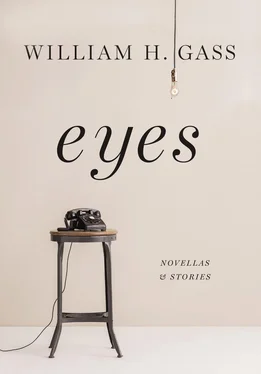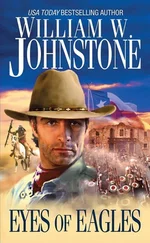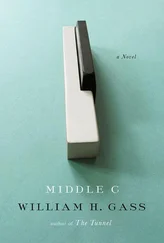Mr. Gab’s eyes ran without relief.
It’s terrible. Why do you have to take everything, Mr. Stu asked desperately. Can’t you see how awful it is for Mr. Gab?
What?
Mr. Stu tried to speak more clearly — slowly and precisely as, in the Home, he had once been taught. By switch and rule and ruler.
Order of the court, seized on suspicion, the detective finally said, leaving the place himself. The walls were bare except for the shiny zinc heads of the roofing nails. The tables sheltered nothing under them now, while the emptied tops merely supported that absence, and reflected the glare of canned bulbs through a mist made of shoe-scuffled dust. The air though was heavy, and Mr. Stu felt the trestles groan. Then the men with their big damp backs were gone. The truck was driven off, and the detective and his Albanian henchman vanished as though they’d become street trees.
Mr. Gab was where he’d been the entire time, still painfully silent, his face oozing away into grief, perhaps not to return. Mr. Stu, out of a need to soften the barrenness about them, slowly turned the cans off, so only the late-afternoon light, made gauzy by the dirty window it oozed through, illuminated the room. Then Mr. Gab moved to wreeeeek the shutters down. Here and there a streak of sun would reach deeply into the darkness of the shop. What are we going to do? Mr. Stu spoke to himself more clearly than he spoke to strangers. At least you have those photographs engraved on the balls of your eyes.
Don’t accuse me, Mr. Gab finally said, smearing his face with a shirtsleeve. What evidence can they have — from that fellow, I mean, Mr. Stu ventured. I gave him the slip, Mr. Gab said slowly, separating the words with consternation. He wanted a receipt for his cash. So I gave him the slip. He’ll have a — Well, maybe not, Mr. Stu said and received a bleak look for his pains. Not the first times, but the last time. Then I gave him one. Still, Mr. Stu persisted, you couldn’t have known — I knew, and he knew I knew, Mr. Gab said firmly. It was a Lange I had to have. A face of pain — pale gray — as if — a face worn wooden by a wind. I’m sorry, Mr. Gab added. They’ve taken away my beauties, but I’ve taken away your world, u-Stu, as thoroughly as they’ve taken away mine. Mr. Gab wavered when he walked, a pushover who now resembled the old rug he had hung for a door.
Mr. Stu sat carefully in Mr. Gab’s chair. It was not all that comfortable. Slivers of sun, as though from a fire at their front door, raced through the shutters and ran up the rear wall, now wholly exposed, the faint shadow of a table against the plaster like a patch of unsunburned skin. When someone passed by on the sidewalk, the pattern palpitated. It was true that Mr. Gab didn’t have much of a life. He sat in this not very comfortable chair most of every day, letting his eyes lie idle or roam randomly about like a foraging pooch, thinking who knew what thoughts, if he thought any, and if he thought any, who knew that either. Now, and even more often then, Mr. Gab would reluctantly help a customer, and once in a great while do a bit of business behind the rug where the rug quite muffled the doing. You’d have to account it a life overflowing with empty. But that life had better prepare to be so much worse, and embrace mere absence like a lover. Nevertheless, who knew how to count these things: the quality of an existence — especially when you compared it to the meager stuff that took place in the deranged world outside — in walking these formerly narrow aisles, talking occasionally, eating meagerly, drinking rarely, sitting rudely on a board seat long hours, leafing a leaf from an out-of-date mag, arguing with an image in a catalogue, watching faint figures pass?
Mr. Stu let his eye run back and forth along the light like a squirrel on a wire. His life wasn’t a winner either. Yet he had a job, a room, a library card. And he could open a book as if it were a door and disappear. He could inhale air in his weedy lot. He could look. He’d even learn. Yet he’d already found Sundays a stretch. He was supposed to stay home and pretend to be a person of substance in that slummy brown shoebox space of his. Itemize the alley. When the walls were whisked away? When the window went, what could he count? When his little box of belongings was put on the sidewalk outside, what would he manage? Mr. Gab, Mr. Gab, what were they to do? And when they took Mr. Gab downtown for questioning, and found what they would find in box after box, folder after folder, plastic pocket after pocket, how could either of them stand it?…endure it?…live through it? It was…awful…unrelievedly…foul. Mr. Gab reappeared with a bundle. He wore, for once, a wry smile. Quick as a cat Mr. Stu vacated the chair.
There are signs the dick went up the ladder to my loft, Mr. Gab said, but the dick missed this, wrapped in a sheet, under my cot. He held it out as you would a tray of sweets. There was a great wad of sheet to be clumsily unwound before a photogravure, rubber-banded between cardboards for its protection, was released. Mr. Gab put the print where a streak of sunlight crossed a trestle so they could see it. An Eastern moment, Mr. Gab said softly, and Mr. Stu saw the most beautiful silklike scene he’d ever, which Mr. Gab explained was a Stieglitz from 1901 called Spring Showers . Composed by a god, Mr. Gab whispered, as if the detective might overhear. He also spoke in awe, Mr. Stu knew. Like an oriental hanging, Mr. Gab said, as though the mottled gray surface was that of cloth. Less than half a foot wide, a foot tall, made almost solely of shadow, Mr. Stu saw there in the dimness a street sweeper in wet hat and wet slicker pushing a wide broom along a wet gutter toward the photograph’s wet left edge. Despite Mr. Stu’s despair the image made him feel good for a moment, then worse. Just off-center, though on the same side as the sweeper, so that the right two-thirds of the picture was empty of everything except some soft faint shapes that represented traffic on the street, there grew a sidewalk tree with a gently forking trunk protected, perhaps from being pissed on, by a round wrought-iron fence whose pickets were thin as sticks. Surrounded by the sweetest vagueness, the tree rose from the walk on its own wet and wavy shadow as though that dripping shadow were a root, easing toward its dim thin upper limbs, which were dotted with brief new leaves and one perched bird, to faintly foliate away in indistinctness, though there were hints that tall buildings might block you if you entered the background, as well as shimmers that signified some moving vehicles, and the loom of a large ornamental urn — was it? — the viewer could not be sure.
What was certain was the photograph’s depth, its purity, its delicacy. And the silken faintly hazy and amorphous gray that made up most of this small and simple streetside scene was the most beautiful, most comforting, most expressive quality of all. It was everywhere as wet, Mr. Stu realized, as Mr. Gab’s face had been before his sleeve had swabbed it. Gloom began descending like a jacket hood, because his admiration could not keep misery away, not for long. Beauty eventually increased the pain. Perhaps not in better days. Mr. Stu understood incompleteness for he was plete aplenty. Mr. Gab understood loss because he was its cause as well as its victim. Pictures someone had taken, he’d taken, taken and hid. Now these prints had been wrenched from him in turn, and were nowhere where they might be gratefully seen — pictures that had been selfishly sequestered, then put like bad kids “in custody,” to be examined by eyes that were mean and sharpened by the crude rough looks of criminals.
His shoulders in such a slump they ceased to be, Mr. Gab went with his treasure through the carpet again. Part of the rug had pulled from its tacks so that now its hang was uneven. It bore a diamond design that Mr. Stu had never noticed before, cut deeply into its pelt. In better days he would have dreamed it outlined a playing field where figures the size of small ants might run about. Throughout the shop sunlight flickered for a moment. Someone was passing. In better days the store would still be open. Mr. Stu thought that when masses were made of mist and shadow, as they were in Stieglitz’s painterly picture, and loomed without any consequences caused by bulk or weight, they possessed their own kind of being, and that the photograph, which had so little that was definite in it, nevertheless presented us with a whole world made of fragility and levitation. What would it mean to a man to have made such — there was no other word for it — such beauty? to have drawn it in through rainwatered eyes? to have captured it in a small now antiquated box? brought it to life almost amniotically? (another from his daily assignment of words) and sent it forth in the style of a far-off culture that he had learned about solely from photographic samples. Would it fill his life with satisfaction and achievement, or would it sadden him, since a loveliness of that kind could never be repeated, could never be realized again?
Читать дальше












